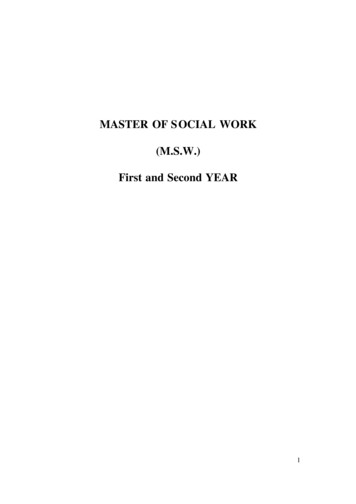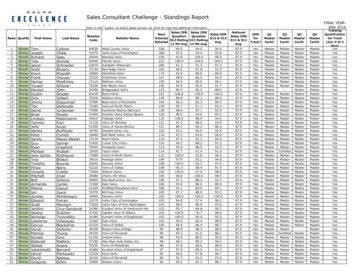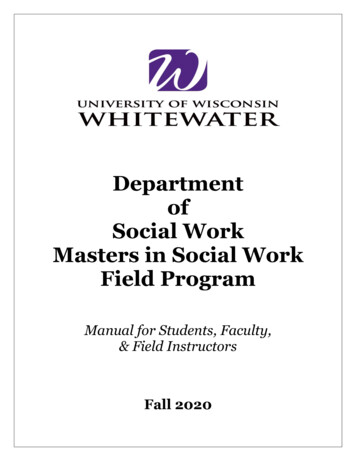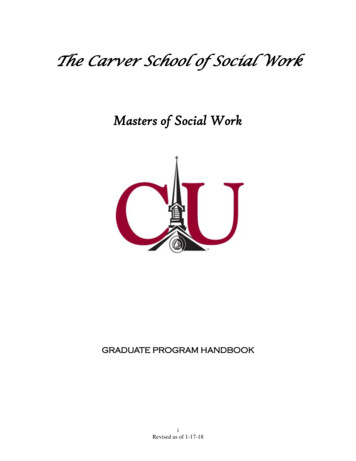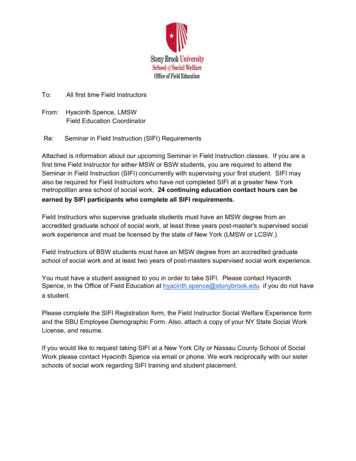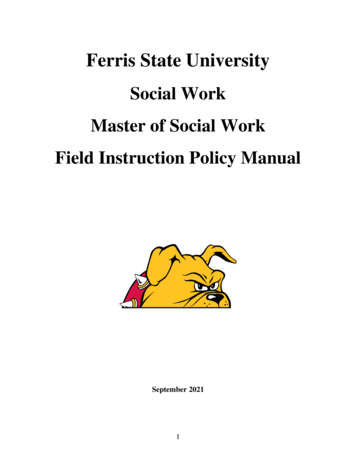
Transcription
Ferris State UniversitySocial WorkMaster of Social WorkField Instruction Policy ManualSeptember 2021I
CONTACT INFORMATIONField Director, Main CampusDr. Dana Holcomb, LMSW, DSWASC 2092231-591-2763DanaHolcomb@ferris.eduField Director, Northern RegionJoanie Hazelton, LMSWUniversity Center, Traverse City CampusFSU Social Work Office231-995-1715JoanieHazelton@ferris.eduMSW Program DirectorDr. Janet Vizina-Roubal, LMSW, DSWASC 2094231-357-2817JanetVizinaRoubal@ferris.eduSocial Work Department ChairDr. Michael Berghoef, PhDASC 2108231-591-2737MichaelBerghoef@ferris.edu1
TABLE OF CONTENTSIntroduction. 4MSW ProgramEducational Philosophy . 5FSU Vision .5NASW Six Core Values . 5-6MSW Program Mission .6MSW Program Goals . 6Program Practice Competencies and Learning Outcomes .7Description of Field Placements .12Role Descriptions and ResponsibilitiesField Director .12-13Agency Based Field Instructor . 13Field Liaison/Field Seminar Instructor.13-14Student .14-15Student Field Placement Policies and ProceduresEligibility for Field .15Student Placement Procedures 15-16Field Integrative Seminar .16Agency Field Placement Policies and ProceduresAgency Selection Criteria .16Rights and Responsibilities of Field Agencies .17Field Instructor Criteria .17Evaluation of Field Placement PerformanceLearning Agreement Guidelines .18-19Intern Placement Tracking (IPT) System 19Problems in Placement and Problem-Solving Procedures .19-21Student PoliciesBackground Checks, Felony Convictions, Drug Testing, TB Testing, and Physicals .21COVID-19 .21Placement at Student’s Place of Employment .21-22Service Continuity .222
Insurance Coverage .22Technology/Social Media Use .23Confidentiality .23-24Dual Relationships 24Personal Safety .24Research Involving Human Subjects .25Ferris State University Harassment Policy .25-27Consensual Relationships Between University Employees and Students 273
IntroductionThe purpose of this field manual is to outline the policies, procedures, roles, and responsibilities thatgovern field education for students in the Ferris State University’s (FSU) Master of Social Work (MSW)Program. This manual is intended for students, field instructors, field agencies, faculty, administrators,and the program advisory committee. The MSW Field Instruction Manual is meant to be a guideline andreminder of the "learning relationship" among students, field instructors, and social work faculty.These policies have been established in an effort to guide each participant in the accomplishment of thefield objectives of social work education.Field instruction is the direct practice portion of social work education, and the program's "signaturepedagogy.” It is an educationally directed, coordinated, and monitored field experience required of allsocial work students. Each student is expected to progressively build upon his/her knowledge and skillsfrom one semester to the next. In the field, students are to demonstrate knowledge, values, and skills inreal life situations under supervised instruction and in accordance with their individualized learning plans.Field is where the student is expected to demonstrate all they have learned in the classroom in the ninepractice competencies (ethical and professional behavior; diversity; social, economic, and environmentaljustice; research; policy; and engaging, assessing, intervening, and evaluating practice).Classroom learning and theoretical content are integrated with the focus on generalist practice in thefoundation year and clinical practice in the advanced year. In an effort to continue the integration of fieldand classroom, all students will be required to attend a field seminar which provides continuededucational and administrative support for the learning environment. The field seminar is integrated intothe field education course and accounts for 10 hours per semester. The field liaison for each student isalso the field seminar instructor. The field seminar meets approximately three times per semester asagreed upon by the field seminar instructor and the students assigned to that section.4
Social Work ProgramFerris State UniversityPhilosophy, Vision, Core Values, Mission Statement, and Program GoalsEducational PhilosophyThe Ferris State University Mission states that our university:“ prepares students for successful careers, responsible citizenship, and lifelong learning. Through its manypartnerships and its career-oriented, broad-based education, Ferris serves our rapidly changing globaleconomy and society.”We are fortunate that our Founder Woodbridge N. Ferris, who once said ““The highest work is that ofsocial work”, set a course for our university that resulted in a mission so consonant with our social workprogram. Likewise, we embrace and promote the Ferris State University Core Values of Collaboration,Diversity, Ethical Community, Excellence, Learning and Opportunity, which are consistent with those ofour program and profession. These core values are in harmony with our professional values and areinfused in our collaborative efforts with others across the university. We strive to live these values andencourage our students to put them into practice.FSU VisionThe FSU vision is to be “the recognized leader in integrative education, where theory meets practicethroughout the curriculum, and where multi-disciplinary skills important in a global economy aredeveloped with the result that Ferris State University will also be: “The preferred choice for students who seek specialized, innovative, career- and life-enhancingeducation.The premier educational partner for government, communities, agencies, businesses, andindustries through applied research and joint ventures.A stimulating, student-centered academic environment that fosters life-long engagement,leadership, citizenship, and continuing intellectual development.A university that aligns its practices and resources in support of its core values of collaboration,diversity, ethical community, excellence, learning, and opportunity.”(Ferris State University, esident/vision.htm)This vision is embedded in our curriculum and its realization will be evident in the practice of ourgraduates. Graduates will emerge as leaders and lifelong learners that are active in their communities.National Association of Social Workers (NASW) Six Core ValuesAs members of the NASW, our Code of Ethics identifies specific values to which we as a profession aspire.Our MSW program is founded on these six core values: Service: Social workers’ primary goal is to help people in need and to address social problems.Social Justice: Social workers challenge social injustice.5
Dignity and Worth of the Person: Social workers respect the inherent dignity and worth of theperson.Importance of Human Relationships: Social workers recognize the central importance of humanrelationships.Integrity: Social workers behave in a trustworthy manner.Competence: Social workers practice within their areas of competence and develop and enhancetheir professional expertise.(NASW Code of Ethics, e-of-Ethics-EnglishStudents and faculty will adhere to the NASW Code of Ethics at all times. Students will be encouraged tojoin the NASW Code of Ethics during their tenure. Membership offers many benefits and students areencouraged to become part of the national organization as professional social workers.MSW Program MissionThe mission of the FSU MSW Program is to educate professional social workers to be leaders in their fieldthrough promoting social and economic justice, diversity, and addressing oppressive social conditions.Graduates will exemplify the FSU Core Values of Collaboration, Diversity, Ethical Community, Excellence,Learning, and Opportunity. Graduates will be critical thinkers, able to meet the challenges of a globalsociety through lifelong learning, innovation, political engagement, service, and community collaboration.MSW Program Goals1.Prepare social workers with the knowledge, skills, and values to be advanced social workpractitioners with individuals, groups, and families, toward the enhancement of social interactionand human functioning.2. Prepare social workers to practice without prejudice or discrimination towards thosemarginalized populations in the global community with respect to social work values andstandards. Promote and be an advocate for social diversity.3. Prepare social workers to engage in activities that promote collaboration and lifelong learningtoward the effective performance of personal and professional responsibilities.4. Prepare social workers with state of the art evidenced based clinical practice skills to assistpeople in healing trauma, while finding additional social/political solutions to meet their life goals.Program Practice Competencies and Learning Outcomes***NOTE: ADVANCED PRACTICE BEHAVIORS ARE IDENTIFIED IN BOLD AND ITLICIZEDThe Council on Social Work Education (CSWE) has identified nine competencies in its Educational Policyand Accreditation Standards (EPAS) that all professional social workers should be able todemonstrate. These competencies are woven into our curriculum and assessment of student learning.(CSWE Commission on Accreditation, 2015. licies/2015-EPAS )6
Practice Competency #1: Demonstrate Ethical and Professional BehaviorSocial workers understand the value base of the profession and its ethical standards as well as relevantlaws and regulations that may impact practice at the micro, mezzo, and macro levels. Social workersunderstand frameworks of ethical decision-making and how to apply principles of critical thinking tothose frameworks in practice, research, and policy arenas. Social workers recognize personal values andthe distinction between personal and professional values. They also understand how their personalexperiences and affective reactions influence their professional judgment and behavior. Social workersunderstand the professions history, its mission and the roles and responsibilities of the profession. Socialworkers recognize the importance of life-long learning and are committed to continually updating theirskills to ensure they are relevant and effective. Social workers also understand emerging forms oftechnology and the ethical use of technology in social work practice.Social Workers:1. Make ethical decisions by applying the standards of the NASW Code of Ethics, relevant lawsand regulations, models for ethical decision-making, ethical conduct of research, and additionalcodes of ethics as appropriate to context;2. Use reflection and self-regulation to manage personal values and maintain professionalism inpractice situations;3. Demonstrate professional demeanor in behavior; appearance; and oral, written, and electroniccommunication;4. Use technology ethically and appropriately to facilitate practice outcomes;5. Use supervision and consultation to guide professional judgment and behavior, with emphasis onsecondary traumatic stress and trauma triggers;6. Understand and identify professional strengths, limitations and challenges;7. Tolerate ambiguity in resolving conflicts and Apply ethical decision-making skills to issues specific toclinical social work;8. Identify and use knowledge of relationship dynamics, including power differentials; and9. Recognize and manage personal biases as they affect the therapeutic relationship in the service ofclients’ well-being.Practice Competency #2: Engage Diversity and Difference in PracticeSocial workers understand how diversity and difference characterize and shape the human experienceand are critical to the formation of identity. The dimensions of diversity are understood as theintersectionality of multiple factors including but not limited to age, class, color, culture, disability andability, ethnicity, gender, gender identity and expression, immigration status, marital status, politicalideology, race, religions/spirituality, sex, sexual orientation, and tribal sovereign status. Social workersunderstand that, as a consequence of difference, a person’s life experiences may include oppression,poverty, marginalization, and alienation as well as privilege, power, and acclaim. Social workers alsounderstand the forms and mechanisms of oppression and discrimination and recognize the extent towhich a culture’s structures and values, including social, economic, political, and cultural exclusions, mayoppress, marginalize, alienate, or create privilege and power.Social Workers:1. Apply and communicate understanding of the importance of diversity and difference in shaping lifeexperiences in practice at the micro, mezzo, and macro levels;7
2. Present themselves as learners and engage clients and constituencies as experts of their ownexperiences;3. Apply self-awareness and self-regulation to manage the influence of personal biases and values inworking with diverse clients and constituencies;4. Research and apply knowledge of diverse populations to enhance client well-being and work effectivelywith diverse populations;5. Identify and use practitioner/client differences from a strengths and trauma informed perspective; and6. Demonstrate knowledge of historical trauma and its impact on diverse populations.Practice Competency #3: Advance Human Rights and Social, Economic, and Environmental Justice.Social workers understand that every person regardless of position in society has fundamental humanrights such as freedom, safety, privacy, and adequate standard of living, health care, and education. Socialworkers understand the global interconnections of oppression and human rights violations, and areknowledgeable about theories of human need and social justice and strategies to promote social andeconomic justice and human rights. Social workers understand strategies designed to eliminateoppressive structural barriers to ensure that social goods, rights, and responsibilities are distributedequitably and that civil, political, environmental, economic, social, and cultural human rights areprotected.Social Workers:1. Apply their understanding of social, economic, and environmental justice to advocate for human rightsat the individual and system levels:2. Engage in practices that advance social, economic, and environmental justice; and3. Apply their understanding of social, economic, and environmental justice to advocate for human rightsat the individual and/or system levels.4. Use knowledge of the effects of oppression, discrimination, and historical trauma on client and clientsystems to guide engagement, assessment, intervention, and/or termination.Practice Competency #4: Engage in Practice- informed Research and Research- informed Practice.Social workers understand quantitative and qualitative research methods and their respective roles inadvancing a science of social work and in evaluating their practice. Social workers know the principles oflogic, scientific inquiry, and culturally informed and ethical approaches to building knowledge. Socialworkers understand that evidence that informs proactive derives from multi-disciplinary sources andmultiple ways of knowing. They also understand the processes for translating research findings intoeffective practice.Social Workers:1. Use practice experience and theory to inform scientific inquiry and research;2. Apply critical thinking to engage in analysis of quantitative and qualitative research methods andresearch findings;3. Use and translate research evidence to inform and improve practice, policy and service delivery; and4. Use evidence-based practice process in clinical assessment and intervention with clients.8
5. Participate in the generation of new clinical knowledge with respect to trauma through research andpractice.6. Use research methodology to evaluate clinical practice effectiveness and/or outcomes.Practice Competency #5: Engage in Policy Practice.Social workers understand that human rights and social justice, as well as social welfare and services, aremediated by policy and its implementation at the federal, state, and local levels. Social workersunderstand the history and current structures of social policies and services, the role of policy in servicedelivery, and the role of practice in policy development. Social workers understand their role in policydevelopment and implementation within their practice settings at the micro, mezzo, and macro levelsand they actively engage in policy practice to effect change within those settings. Social workersrecognize and understand the historical, social, cultural, economic, organizational, environmental, andglobal influences that affect social policy. They are also knowledgeable about policy formulation, analysis,implementation, and evaluation.Social Workers:1. Identify social policy at the local, state, and federal level that impacts well-being, service delivery, andaccess to social services;2. Assess how social welfare and economic policies impact the delivery of and access to social services;3. Apply critical thinking to analyze, formulate and advocate for policies that advance human rights andsocial, economic, and environmental justice; and4. Communicate to stakeholder, administrators and/or legislators the implications of policies and policychange in the lives of clients.5. Use evidence-based practice and practice-based evidence in advocacy for policies that advance socialand economic well-being.Practice Competency #6: Engage with Individuals, Families, Groups, Organizations, and CommunitiesSocial workers understand that engagement is an ongoing component of the dynamic and interactiveprocess of social work practice with, and on behalf of, diverse individuals, families, groups, organizations,and communities. Social Workers value the importance of human relationships. Social workersunderstand theories of human behavior and the social environment, and critically evaluate and apply thisknowledge to facilitate engagement with clients and constituencies, including individuals, families,groups, organizations, and communities. Social workers understand strategies to engage diverse clientsand constituencies to advance practice effectiveness. Social workers understand how their personalexperiences and affective reactions may impact their ability to effectively engage with diverse clients andconstituencies. Social workers value principles of relationship-building and inter-professionalcollaboration to facilitate engagement with clients, constituencies, and other professionals asappropriate.Social Workers:1. Apply knowledge of human behavior and the social environment, person-in-environment, and othermultidisciplinary theoretical frameworks to engage with clients and constituencies;9
2. Use empathy, reflection, and interpersonal skills to effectively engage diverse clients andconstituencies;3. Develop culturally responsive therapeutic relationships;4. Attend to the interpersonal dynamics and contextual factors including the use of technology that bothstrengthen and potentially threaten the therapeutic alliance during the engagement phase.5. Establish a relationship-based process that encourages clients to be equal participants in theestablishment of treatment goals and expected outcomes.Practice Competency #7: Assess Individuals, Families, Groups, Organizations, and CommunitiesSocial workers understand that assessment is an ongoing component of the dynamic and interactiveprocess of social work practice with, and on behalf of, diverse individuals, families, groups, organizations,and communities. Social workers understand theories of human behavior and the social environment,and critically evaluate and apply this knowledge in the assessment of diverse clients and constituencies,including individuals, families, groups, organizations, and communities. Social workers understandmethods of assessment with diverse clients and constituencies to advance practice effectiveness. Socialworkers recognize the implications of the larger practice context in the assessment process and value theimportance of interprofessional collaboration in this process. Social Workers understand how theirpersonal experiences and affective reactions may affect their assessment and decision making.Social Workers:1. Collect and organize data, and apply critical thinking to interpret information from clients andconstituencies;2. Apply knowledge of human behavior and the social environment, person-in-environment, and othermultidisciplinary theoretical frameworks in the analysis of assessment data from clients andconstituencies;3. Develop mutually agreed-on intervention goals and objectives based on the critical assessment ofstrengths, needs, and challenges within clients and constituencies; and4. Select appropriate intervention strategies based on the assessment, research knowledge, and valuesand preferences of clients and constituencies.5. Synthesize and differentially apply theories of human behavior in the social environment utilizing atrauma informed perspective to guide clinical practice.6. Use bio-psycho-social-spiritual theories, trauma informed perspective, and diagnostic classificationsystems in formulation of comprehensive assessments.7. Asses clients’ readiness for change.8. Assess client’s coping strategies to reinforce and improve adaptation to life situations, circumstances,and events.Practice Competency #8: Intervene with Individuals, Families, Groups, Organizations, and CommunitiesSocial workers understand that intervention is an ongoing component of the dynamic and interactiveprocess of social work practice with, and on behalf of, diverse individuals, families, groups, organizations,and communities. Social workers are knowledgeable about evidence-informed interventions to achievethe goals of clients and constituencies, including individuals, families, groups, organizations, andcommunities. Social workers understand theories of human behavior and the social environment, andcritically evaluate and apply this knowledge to effectively intervene with clients and constituencies. Social10
workers understand methods of identifying, analyzing and implementing evidence-informedinterventions to achieve client and constituency goals. Social workers value the importance of interprofessional teamwork and communication in interventions, recognizing that beneficial outcomes mayrequire interdisciplinary, inter-professional, and inter-organizational collaboration.Social Workers:1. Critically choose and implement interventions to achieve practice goals and enhance capacities ofclients and constituencies2. Apply knowledge of human behavior and the social environment, personal-in-environment, and othermultidisciplinary theoretical frameworks in interventions with clients and constituencies;3. Use inter-professional collaboration as appropriate to achieve beneficial practice outcomes;4. Negotiate, mediate, and advocate with and on behalf of diverse clients and constituencies;5. Facilitate effective transitions and endings that advance mutually agreed-on goals;6. Promote social and economic justice causes through political advocacy and community intervention;7. Select and modify appropriate best practice intervention strategies based on continuous clinicalassessment.8. Demonstrate sensitivity to trauma experiences and the role of trauma when implementinginterventions, goals and objectives;9. Demonstrate the use of appropriate clinical techniques for a range of presenting concerns identified inthe assessment, including crisis intervention strategies as needed and trauma focused as needed;10. Collaborate with other professionals to coordinate treatment interventionsPractice Competency #9: Evaluate Practice with Individuals, Families, Groups, Organizations, andCommunitiesSocial workers understand that evaluation is an ongoing component of the dynamic and interactiveprocess of social work practice with, and on behalf of, diverse individuals, families, groups, organizationsand communities. Social workers recognize the importance of evaluating processes and outcomes toadvance practice, policy, and service delivery effectiveness. Social workers understand theories of humanbehavior and the social environment, and critically evaluate and apply this knowledge in evaluatingoutcomes and practice effectiveness.Social workers:1. Select and use appropriate methods for evaluation of outcomes;2. Apply knowledge of human behavior and the social environment, person-in-environment, and othermultidisciplinary theoretical frameworks in the evaluation of outcomes;3. Critically analyze, monitor, and evaluate intervention and program processes and outcomes;4. Apply evaluation findings to improve practice effectiveness at the micro, mezzo, and macro levels;5. Use clinical evaluation of the process and outcomes to develop best practice interventions for a range ofbio-psycho-social-spiritual conditions and traumatic experiences;6. Facilitate transitions and endings; and7. Contribute to the theoretical knowledge base of the social work profession through practice-basedresearch.11
Description of Field PlacementsStudents in the foundation program will have two separate field placements. The first-year fieldplacement will concentrate on generalist social work practice and will mirror the placement sites utilizedin the undergraduate social work program. The field placement will span two semesters and requires 480hours in the field and 20 hours in field seminar (10 hours per semester).Students entering the program as "advanced standing" students will have only one field placement. Thisplacement is specific to clinical social work practice. Students in either their advanced year will be in thefield over three semesters requiring 640 hours total (240 hours for the first semester, 240 hours for thesecond semester, and 160 hours for the third semester per semester), and 30 hours in field seminar (10hours per semester).Role Descriptions and ResponsibilitiesThe field instruction program consists of four primary roles: the Field Director, the field liaison andseminar instructor, the agency-based field instructor, and the student. Primary decision making for thefield rests with the Field Director in conjunction with the MSW Program Director and the Social WorkDepartment Chair.Field DirectorRole: Has primary responsibility for the administration of the Field Instruction Program.Responsibilities: Development and coordination of the Field Instruction Program. Coordination and placement of all students. Selection of new placements. Maintenance of current field sites. Coordination and communication among all partners of the program. File maintenance for all sites which contains a general agency description, field instructorcredentials and experience, and an outline of agency expectations and learning assignments.Ensure site and supervisor meets all required criteria. Report to faculty, as needed, on development of placement sites. Provide a continuing effort to expand field instruction placement sites. Provide orientation concerning all aspects of field instruction through regularly scheduledworkshops, trainings, or conferences with involved agency staff. Provide ongoing training toexperienced field instructors. Conduct individual student conferences for the purpose of selection and approval of an agencyplacement. Assess student strengths, needs, and interests in the process of matching each student with aplacement site/internship. Evaluate field agencies with input from field liaisons, field instructors, and students Convene the Program Advisory Committee and ad hoc student advisory committees as needed Consult with the Program Director on field education/student concerns to ensure the integrity ofthe program.12
Prepare an annual report on the field education program for the Program Director, faculty, andProgram Advisory Committee.Agency-Based Field InstructorRole: Is that of a teacher and a gatekeeper for the profession of social work.Responsibilities: Confer with the Field Director during the planning stages of a potential student’s placement. Complete and sign agreement to accept student. Attend Field Instructor Workshops sponsored by the social work program. Provide the student with a thorough orientation to the agency that addresses safety in the field. Develop with the student a “Learning Plan” defining learning objectives that are
Ferris State University Social Work Master of Social Work Field Instruction Policy Manual September 2021. 1 CONTACT INFORMATION Field Director, Main Campus Dr. Dana Holcomb, LMSW, DSW ASC 2092 231-591-2763 DanaHolcomb@ferris.edu Field Director, Northern Region Joanie Hazelton, LMSW


